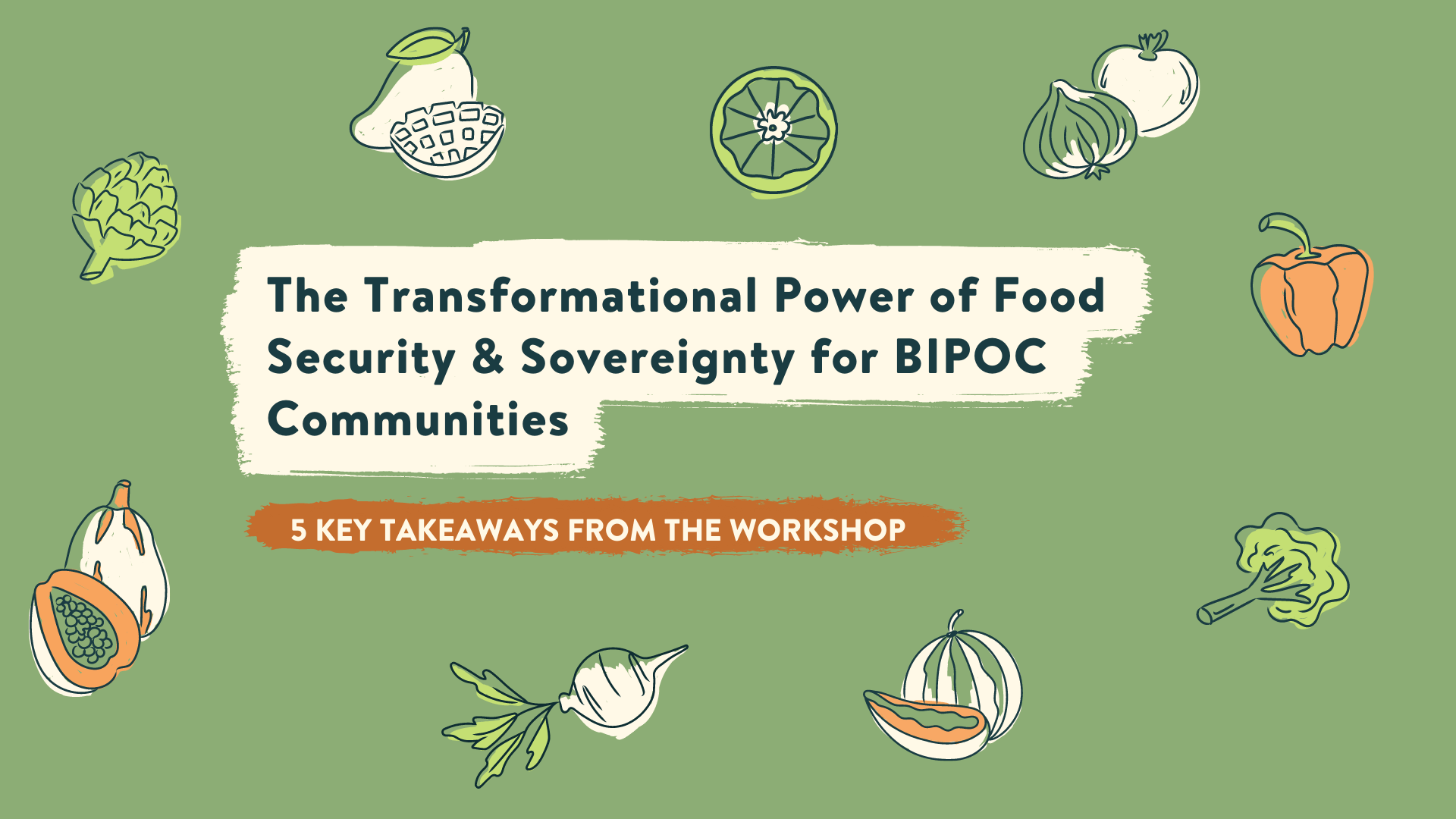5 Takeaways from the Food Security and Sovereignty for BIPOC Communities Workshop
The Transformational Power of Food Security and Sovereignty for BIPOC Communities workshop was hosted online by YouthREX on the 17th of December 2020.
In food justice work, everyone has a different narrative for how they got into it, and each person’s narrative should be considered when striving for what Chantal Phillips, workshop facilitator, called an “enhanced food focus”. To achieve this, us as individuals, who may or may not work with youth, should see our work as being connected to food whether directly or indirectly. By assessing this connection and the agency we have in our communities and personal lives, we can better establish practical and long-term adjustments which benefit youth. Three panelists shared their own narratives: Dr. Taima Moeke-Pickering, a Maori of the Ngati Pukeko and Tuhoe Tribes from Aotearoa, New Zealand, and a Professor in the School of Indigenous Relations at Laurentian University, Rosie Mensah, a registered dietician who advocates for food justice and health equity, and Mosheh Herdsman, a community organizer at Progress Toronto.
Some facts to consider :
- The Government of Canada defines food insecurity as “Inability to acquire or consume an adequate diet quality or sufficient quantity of food in socially acceptable ways, or the uncertainty that one will be able to do so.”
- Research shows that out of a total population of 36.5 million people (2017), the number of people living in food insecure households in Canada increased from 3.4 million in 2007 to 4.4 million in 2018, roughly 12% of the population (PROOF, University of Toronto).
- Food insecurity is directly linked to race and ethnicity – Black and indigenous people face the highest rates of food insecurity at 28.9 and 28.2 percent respectively, with Arab and West Asian communities also affected at 20.4% (Broadbent Institute Canada).
Here are my five takeaways from this workshop, for those who couldn’t make it, or who might want a refresher on the day’s discussions.
1. While food can shape our lives in positive ways, the grim realities of food security and food justice mean that there is a power imbalance in who controls and has access to food, with BIPOC (Black, Indigenous, and people of colour) communities disproportionately affected.
How does food shape your life? My first response was that food connects me to my family. My answer shifted when the workshop framed food in the contexts of access, security, and power. Food still means family to me, but I also thought of the food insecurity my family experienced in the first few years of my life, and our family’s privilege now being food secure.
2. There is a clear connection between community organizations who empower people through food and shifting the power for BIPOC people.
For Mosheh, his work on a campaign with FoodShare helped him to see that food was political. His work with Black Creek Community Farm, which provides culturally appropriate and good food to the community, helped him understand that food justice is about having access to something vital for life. Rosie, who has always been interested in food and health, learnt about food justice through her work with Black Creek Community Farm as well. Dr. Taima’s food justice work began through listening to Indigenous people at a UN conference who shared stories of their land resources being depleted, her research project in her hometown, and work with local food organizations where she learnt about the prices, accessibility, and affordability of food. For her, food justice is about the survival of land and culture and merging sustainable solutions with economic and government strategy.
3. There has to be a decolonization approach to food, and food justice.
Dr. Taima spoke of her research on food security in New Zealand and how different age and socioeconomic groups experience food (in)security. She found that the rising influence of Western lifestyles (e.g. fast food) meant that many people are less connected with their families and communities when it comes to food and food medicine. By decolonizing our minds and bodies, we ask ourselves what is truly healthy for us, and recognize the monopoly that multinational corporations have in the food provision industry. We also recognize through this decolonization that food insecurity is not just the fault of one individual or group; instead, the responsibility of food security must be primarily with the government.
4. There must be a collaborative approach to food justice.
Governments must lead the way in this collaborative approach, by paying for labour and providing funding. This can include creating paid positions for members of the community or paying to consult with farmers and community organizations. Community members who face food injustice must also be included in the policy creation and implementation stages of the work. Businesses who do operate in affected areas would do well to contribute funding to local food organizations, and individuals can play their role by creating home gardens where possible and sharing the food with their neighbours.
5. An increased focus on food in programming for youth is necessary, and there are three ways to do this: fund, adapt, and engage.
To fund, youth workers can consider including food as an item in a budget when applying for program grants or reallocating some funding already available to better provide healthy and nutritious food to program participants. To adapt, youth workers may consider having more options of food during the programming and consulting the youth about these options. The engage component is about making space for youth to join in the preparation of the food for the program. This provides the youth with important life skills, and is a fun activity, while allowing them to suggest what food to serve and working with them to create a budget can improve youth’s leadership skills and teach them food literacy.
In conclusion, food justice is work that is both personal and systemic. As individuals, we can work on providing better food during youth programming, and also think more carefully about the food we consume. As a society, existing systems must improve resources dedicated to food, and include more diverse voices in food policy creation and implementation.


